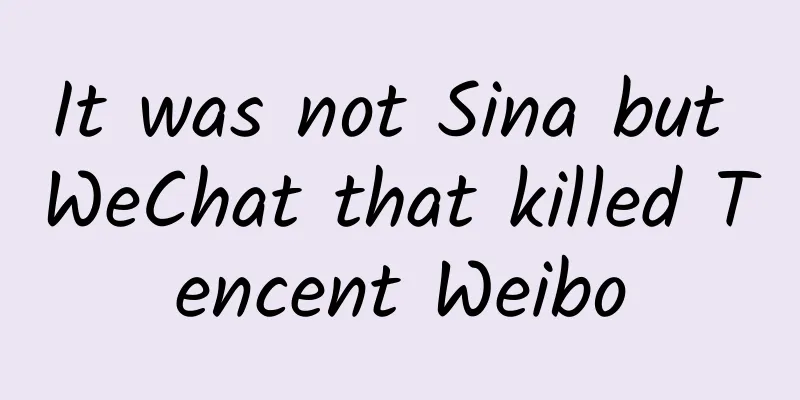It was not Sina but WeChat that killed Tencent Weibo

|
Tencent Weibo has finally met its day of death. On September 4, the Tencent Weibo team issued an announcement stating that due to business adjustments, Tencent Weibo will cease services and operations at 23:59 on September 28, 2020, and users will not be able to log in at that time. Unexpected, yet reasonable. After all, the war on Weibo has long ended; for several years, Tencent Weibo has basically been in a laissez-faire state, with only basic functions maintained - from the perspective of the product cycle, Tencent Weibo has long been dead in name only. Despite this, the fact that Tencent Weibo is about to be officially shut down still makes people sigh: an era has completely ended. The era of microblogs Looking back from 2020, we will find that Twitter is a historically significant part of the Internet's impact on the way human information flows. As Evan Williams, one of the founders of Twitter, said: It’s another step towards democratizing information, and I firmly believe that the future will be better if people can share information more easily. Soon, a category called MicroBlog emerged, which is called Weibo in Chinese. At that time, the development of China's Internet was still in the era of learning from the outside world; after Twitter demonstrated its appeal to users, China's Internet entrepreneurs naturally did not want to be left out, and websites with microblog-like products such as Fanfou, DiGuo, and Jiwai were also launched... But in 2009, these early microblog products encountered regulatory difficulties. Till now, only Wang Xing of Meituan still speaks out on his Fanfou. However, also in 2009, Chinese portal websites began to embrace microblogging services, with Sina being the first to do so. In August 2009, it launched the beta version of "Sina Weibo", and microblogging officially entered the mainstream Chinese Internet population's field of vision... The popularity of Weibo has also generated many hot words and triggered a Weibo craze on portal websites. Entering 2010, thanks to its unique media advantages, Sina Weibo has won a large number of celebrities and fans in its development head start of a few months; at this time, portal websites such as Sohu, NetEase, and Tencent also established their own Weibo platforms - thus, a Weibo war among portal websites began. Among Sina Weibo's many rivals, Tencent Weibo is the strongest and most powerful one. Tencent Weibo started internal testing on April 1, 2010, and opened for registration by invitation on May 1. Thanks to the strong social network and traffic advantages behind Tencent, as well as the media attributes of Tencent.com itself, Tencent Weibo has developed rapidly after its opening. It not only used QQ to attract crazy traffic, but also carried out strong online and offline promotion. Of course, like Sina Weibo, Tencent Weibo has also invited a large number of celebrities to join, such as Liu Xiang, Xu Jinglei, Han Han, etc. At 20:53 on December 10, 2010, Tencent Weibo announced that Liu Xiang's Tencent Weibo audience exceeded 8 million, surpassing Twitter's number one Lady Gaga, becoming the world's undisputed number one Weibo blogger. At that time, Tencent attached great importance to Weibo. For example, at the end of 2010, Tencent issued a regulation requiring all employees to publish high-quality original content on Tencent Weibo and disseminate excellent Weibo posts, 10 times a day. On February 5, 2011, Tencent announced that the number of Tencent Weibo users exceeded 100 million. Ma Huateng: The war on Weibo is over While Tencent Weibo and Sina Weibo were fighting each other to the death, in January 2011, Tencent launched an application called "WeChat" - now WeChat is at its peak, and the story of WeChat is already well known in the Chinese Internet industry. But for Tencent Weibo, the birth of WeChat completely changed its destiny. In 2011, Zhang Xiaolong had not yet become a god, and WeChat was still in its early stages of growth. Its products were also in a stage of rapid iteration and function updates. Features such as "Voice Chat", "Shake", and "Message in a Bottle" brought great surprises to users. In July, WeChat launched the "See People Nearby" feature, and the number of WeChat users increased by more than 100,000 per day without using any QQ resources. In Wu Xiaobo's book "Tencent Biography", there is such a passage: In November 2011, the number of WeChat users increased by 200,000 per day; one day, during his first meeting with Wu Xiaobo, Ma Huateng paused the 20 million yuan advertisement that was about to be launched in Beijing and Shanghai during the banquet - and then said to Wu Xiaobo in a very light voice: The Weibo war is over.
Regarding the status of Tencent Weibo in Ma Huateng's mind, or its positioning in the entire Tencent product system, Ma Huateng himself has a long-standing saying in the industry: Tencent Weibo is a product born for defense. Perhaps Ma Huateng has already determined the fate of Tencent Weibo in private, but in public, especially as a product that Tencent is vigorously promoting, Tencent Weibo is not abandoned all at once. In Tencent’s 2011 annual report released in the spring of 2012, Tencent stated: Tencent Weibo has experienced significant growth in 2011 and has become the largest microblog in China. It had 373 million registered users and 68 million active accounts at the end of the year… As China's leading and influential social media, Tencent Weibo is well positioned to capture the business opportunities that will emerge in the future. In March 2012, Ma Huateng said at the 2012 China (Shenzhen) IT Leadership Summit: In the past two years, the competition in the microblog market has been fierce. Of course, everyone has different foundations and attributes... The traditional 1.0 portal has become a portal without microblogs, and it is developing in this direction. It is necessary to be a portal and pay attention to mobile Internet. Therefore, it is inevitable to invest heavily in this area. This is something that must be done. If you don't do it well and don't invest in it, you will definitely suffer a big loss in the future. So everyone is not counting the cost. We invest tens of millions in advertising, and Sina invests tens of millions in advertising to compete. By the end of 2012, Tencent Weibo users had exceeded 540 million, with 81 million daily active accounts; at the same time, Sina Weibo's figures were 503 million and 46.2 million, respectively. However, behind the seemingly bright figures lies a crisis. Data at the time showed that although Tencent Weibo had a large number of users, most of them were diverted from QQ. Its account utilization rate in 2012 was only 5.03%, far less than Sina Weibo's 36.9%, and its sharing return rate was less than one-third of Sina Weibo. At the annual meeting of that year, Ma Huateng stated:
Tencent Weibo is on the brink of collapse, then on its deathbed In the spring of 2013, Tencent stated in its annual report:
However, in the 2013 Q1 report, Tencent Weibo's average daily active accounts dropped from a peak of 87 million to 81 million. Later, in the 2013 mid-year report and annual financial report, Tencent no longer talked about Tencent Weibo separately, but combined Tencent Weibo with QQ.com and Tencent Video, saying that it was seeking to enrich content and improve user experience. At that time, the WeChat logo appeared on every page of the two financial reports, becoming the logo of Tencent. On November 19, 2013, there was news that Tencent Weibo had begun internal adjustments and some employees would be transferred to other teams. On March 21, 2014, Tencent opened an official account and made statements on Sina Weibo. To some extent, this move meant that Tencent had strategically given up on the Weibo business and acknowledged Sina's victory - six days later, Sina Weibo was renamed "Weibo". From then on, when users mention Weibo, the first thing they think of is "Sina Weibo". In July 2014, The Paper reported that Tencent Weibo had initiated a major restructuring, with its product operations team being integrated into the Tencent News team, and the rest of the staff being transferred to the Tencent Weishi team, leaving only a few people to maintain basic daily operations. A source said: Tencent's Weibo department has been abolished, and all product technology has been transferred to the Internet Media Product Department. Weishi has established a business unit, led by a senior general manager. Weibo will no longer develop new features and will only maintain basic operations. Although this news was officially denied, judging from the subsequent fate of Tencent Weibo, it was not a rumor. Many people in the industry have made various analyses of the loss of Tencent Weibo. For example, some people believe that: The competition between Tencent and Sina on Weibo is basically a competition between departments and companies, and the mentality is different. Weibo is the core of Sina and the last straw, so naturally they hold on tightly. The whole company revolves around Weibo, and all technology, manpower, and operations are centered on Weibo. On the other hand, Tencent is not an "only child" on Weibo, and there is no pressure to support the family. At least there is traffic support, and it can even be free of worries. Of course, the above-mentioned people also talked about the product competition within Tencent. QQ and WeChat are the two legs of Tencent. The failure of Tencent Weibo is inevitable. In any case, in 2014, the outcome of the Weibo battle was decided. Sina was the only giant, and other players, including Tencent, had to withdraw in disgrace. summary On April 23, 2015, Ma Huateng posted a message on Tencent Weibo, the purpose of which was to promote Tencent Video. Since then, Ma Huateng has never updated his Tencent Weibo again until today. In the more than five years since then, Sina Weibo has gradually become the de facto Chinese social network opinion forum, while Tencent Weibo has been half-dead. In the words of users: providing services as the situation demands. Leifeng.com noticed that on the App Store, the last update of Tencent Weibo App was three years ago, mainly to fix problems and improve program stability. Today, Tencent Weibo has a product life of more than 10 years, which is considered old. And in the context of WeChat having grown into a national app with more than 1.1 billion monthly active users, it is time for Tencent Weibo to completely exit the stage of history. Interestingly, "Tencent Weibo will cease operations on the evening of September 28" eventually became a hot search on Sina Weibo. This article is reproduced from Leiphone.com. If you need to reprint it, please go to Leiphone.com official website to apply for authorization. |
<<: You can get as many likes as you want on WeChat! This like tool is amazing
>>: Say goodbye to data cables! Transfer files between mobile and computer faster
Recommend
Three-class training camp "Low-cost customer acquisition in the education industry"
Resource introduction of the Three-Class Training...
Solid info! 5 ideas for new media operations!
Today I’m going to talk about the overall idea of...
Reminder! Be careful when buying medicines with these words on the box!
Expert of this article: Wang Xiaohuan, Doctor of ...
Bidding Models in Internet Advertising - Alliance, RTB, RTA
In (Part 1 - Basic Bidding) and (Part 2 - Smart B...
Which one will be the focus of Meizu's press conference on June 2: Meizu Blue Note 2 or Tmall Magic Box?
Since the release of MX4 in September last year, ...
How to do EDM marketing? Here is a complete guide to promotion
EDM marketing is now used by many product operati...
I heard that people in Guangdong are buying long johns overnight because they are almost crying from the cold!
Key Points ★ The perceived temperature is actuall...
Here is a complete online community event planning plan
The work of operations is to perform a series of ...
Foshan recipe mini program function, how much does it cost to develop a home cooking mini program?
As those born in the 1990s and 2000s have started ...
What are the differences between 400 telephones and ordinary telephones?
Before the emergence of 400 telephone numbers , t...
What to do if you want to weigh yourself in space but always feel like you are floating? Astronauts have a "good helper"
A strong physique and abundant vitality are the &...
How does information flow improve CTR? Ten magical skills, each one is very practical!
Today, taking advantage of the upcoming Qingming ...
Cook said Apple would survive for a thousand years, but Jobs would never say that
Last year, Cook publicly envisioned the future of...
The latest arrangements for the 2022 May Day holiday adjustment: Which specific days will the classes and lessons be made up?
Soon, the May Day holiday will be here. This year&...
Complete guide to Tik Tok operations and the law of attraction!
This article explains the operation of TikTok fro...









